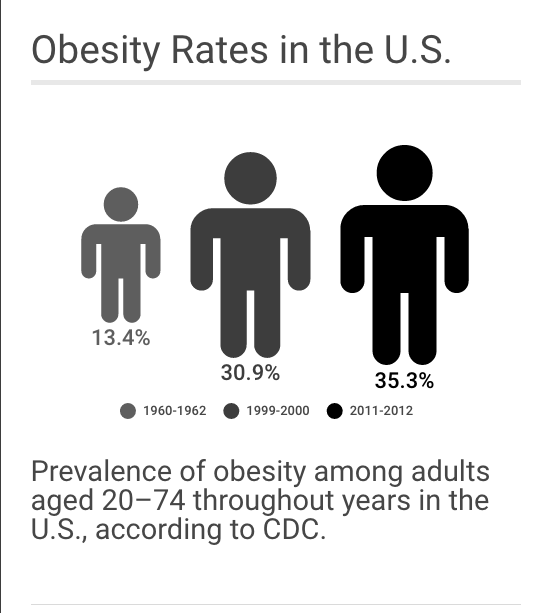Science Journal The Lancet recently published a conclusive study revealing shocking statistics about the global obesity epidemic.
According to the data collected from 1975 through 2014, obesity rates have doubled among women and more than tripled among men in developed countries. Their data also shows rates of malnourishment and incidence of underweight individuals remaining relatively the same in third-world countries.
The U.S. has the highest rate of obesity, obesity-related health issues and medical expenditure. The cost of treating obesity-related illnesses in the U.S. has tripled from $78 billion in 1998 to $270 billion in 2009. Many don’t care about this statistic because we don’t see how it will affect us fiscally, but it will.
Some of the taxes taken out of our paychecks are related to the economic health of this country, because if people are unhealthy, they’ll need to spend money in a clinic or hospital to get better. We need to take action as a nation, or these financial figures will only get uglier.
Obesity is a disease. Unfortunately, it’s also highly stigmatized; people often consider obesity to be the fault of the affected individual more so than a virus that causes them to be sick.
And, for the most part, this is true.
There are a handful of rare genetic predispositions that facilitate some of the main causes behind developing an unhealthy weight; such as Prader-Willi syndrome, tumors or even injuries to certain parts of the brain, altering appetite. However, these cases are extremely rare and account for a negligible percent of obesity rates.
If you are not at the weight you’d like to be, don’t write yourself off as a hopeless case or someone who can’t lose weight. Statistically, that’s not you. Your brain is likely healthy and capable of making a change; it’s just no one ever taught you how to make that change.
The average American lives their life in semi-inactivity. This is not how our ancestors lived. They had to exert a lot more physical energy to attain food.
Be mindful the society we live in is in reality a blissfully ignorant, unsustainable model for the health of the human body. The way people eat and avoid exercise is not acceptable just because it’s the quantitative average. The “average” has been skewed by the comforts our civilization affords us.
However, I strongly discourage taking a huge dive into the fitness world for those completely new to it.
Some people are capable of it and serve as great motivating examples. Their stories are plastered on “The Biggest Loser,” “Dr. Oz” or on the covers of magazines.
What you’ll never see on TV or in the magazines are the countless people who began with the best intentions, but are discouraged by not seeing the physical results they’re looking for and are depressed by the nasty diet or unrealistic regimen they began. It happens at a much higher rate than the success stories. It makes sense because it’s intimidating with no experience: there’s a lot to learn about the body before you begin to understand how to stay healthy.
I propose baby steps. Eat healthier and exercise. Some people may have success with dieting if they’re dedicated, and it’s a good place to start, but the human body was not evolutionarily selected to be sedative. We need to exercise.
Eating healthy can be daunting. There’s a lot of misinformation out there. The reality is, different things work for different people. Here’s a really simple place to start: eat vegetables and fruit. People can keep them in their homes and put them in their backpacks as a mid-day snack to curb blood sugar when tired.
Slowly adding little rewarding eating habits to one’s diet can make the process enjoyable, while cutting out favorite foods all at once can feel like a punishment. If the process isn’t pleasant, a diet change won’t work.
Exercise can be intimidating as well. One might think, “If I’m overweight and I’m running on the street or if I’m weak and lifting in the gym and I look like I don’t know what I’m doing, someone will judge me.”
Not everyone is good at running at first. Setting realistic goals and challenging oneself to be consistent and assessing areas to improve can help one get on the right track. It’s also important to not feel self-conscious when going to the gym. Even the most fit-looking individual is more likely to be impressed by one taking the initiative to be healthy.
Don’t be embarrassed to ask someone for advice, and take one step at a time. Everyone has the chance to obtain a healthy, happy body.



